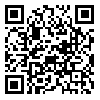Volume 13, Issue 2 (Summer 2018)
jmed 2018, 13(2): 150-160 |
Back to browse issues page
Download citation:
BibTeX | RIS | EndNote | Medlars | ProCite | Reference Manager | RefWorks
Send citation to:



BibTeX | RIS | EndNote | Medlars | ProCite | Reference Manager | RefWorks
Send citation to:
Hayat A, Kojuri J, Kohoulat N, Amini M, Zare S.
What strategies are used for learning by successful medical students?
. jmed 2018; 13 (2) :150-160
URL: http://jmed.ssu.ac.ir/article-1-863-en.html
URL: http://jmed.ssu.ac.ir/article-1-863-en.html
Assistant Professor, Clinical Education Research Center, Shiraz University of Medical Sciences, Shiraz, Iran , ali.hayat63@gmail.com
Abstract: (7548 Views)
Abstract:
- Proper learning strategies are a prerequisite for successful performance in all educational environments. This study aims to investigate the use of various learning strategies in medical students and its relationship with their academic performance.
- In this cross sectional study, data were collected from Medical students in Shiraz University of Medical Sciences. The statistical population of the study included all medical students studying in the academic year 2016-2017 that 250 students were selected by simple random sampling method. Data were collected through motivated strategies for learning questionnaire (MSLQ) which was developed by Printich et al (1993). In this study two learning strategies were investigated; a meta-cognitive strategy including: planning, monitoring and regulating strategies (12 items) and b) resources management strategies including: managing time and study environment (8 items); peer learning (3 items) and help seeking (4 items). Validity and reliability of the questionnaire were confirmed.
- The results showed that the correlation between meta-cognitive learning strategies and resource management components (managing time and study environment, peer learning, help seeking) with students’ academic performance were significant (P<0.01). From which learning strategies components, meta-cognitive strategies with β=0.144 and managing time and study environment with β=0.277 could predict students’ academic performance. The results of ANOVA test showed there there were no difference between students studying at different levels (basic sciences, clinical clerckship) in terms of various learning strategies. There was no significant difference between male and female students in any of the learning strategies.
- The results of this study showed the importance of meta-cognitive and resource management strategies in predicting students' academic performance. Accordingly, the use of these strategies leads to increased learning in students.
Type of Study: Research |
Subject:
Medical Education
Received: 2017/12/23 | Accepted: 2018/04/11 | Published: 2018/10/8
Received: 2017/12/23 | Accepted: 2018/04/11 | Published: 2018/10/8
Send email to the article author
| Rights and permissions | |
 |
This work is licensed under a Creative Commons Attribution-NonCommercial 4.0 International License. |





